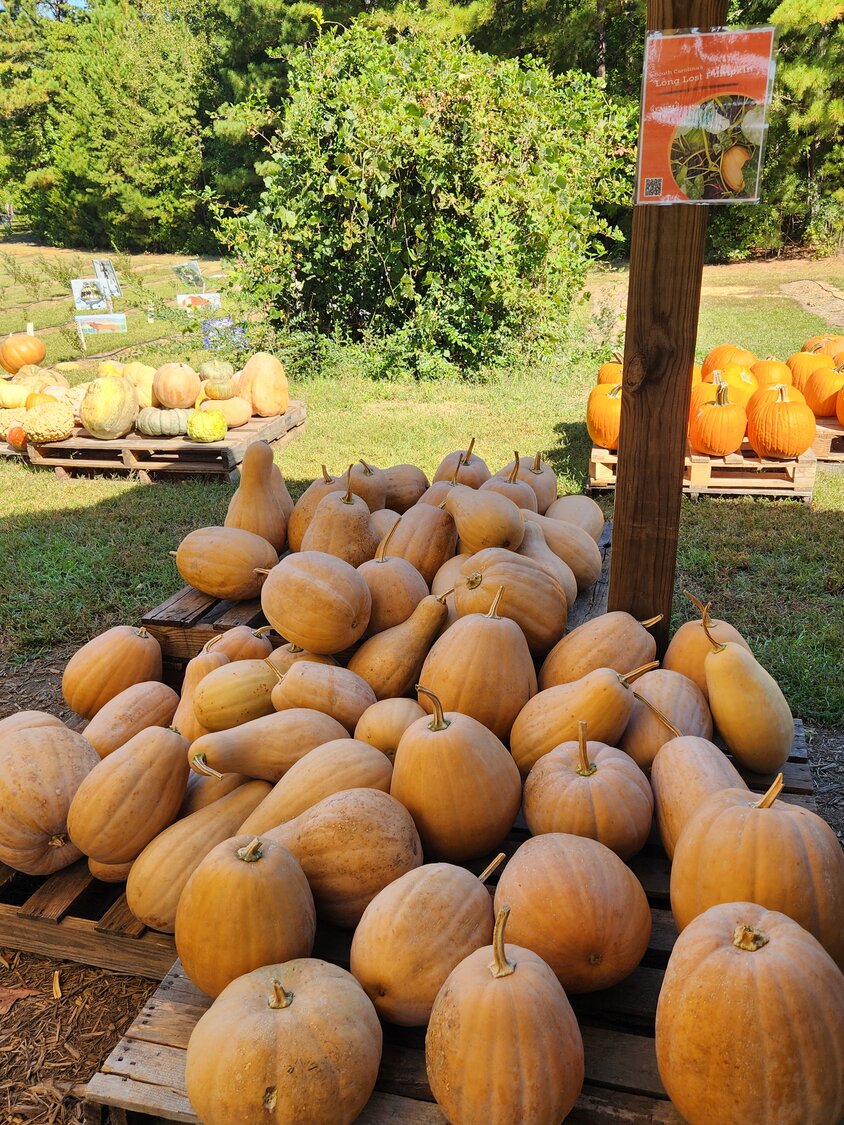Lexington farm looks to bring back heirloom pumpkin, once the local go-to for pies
The Dutch Fork pumpkin was once the preferred pumpkin for pies in South Carolina. And while that tradition has faded over time, one business is bringing it back to Lexington County.
This item is available in full to subscribers.
Subscribe to continue reading. Already a subscriber? Sign in
Get 50% of all subscriptions for a limited time. Subscribe today.
Please log in to continueNeed an account?
|
Lexington farm looks to bring back heirloom pumpkin, once the local go-to for pies
Saturdays through Oct. 28 (rain date for each day is the following Sunday). 9 a.m.-3 p.m. $15 per vehicle ($10 in advance). The FARM 1780. 1127 Corley Mill Rd. thefarm1780.com.
The Dutch Fork pumpkin was once the preferred pumpkin for pies in South Carolina. And while that tradition has faded over time, one business is bringing it back to Lexington County.
The FARM 1780 in Lexington is pushing to reinstate the native varietal, featuring it at its pumpkin patch, which is open through Oct. 28.
“Part of our mission is to bring native items to prominence in the community,” said McKenzie Flashnick, who owns the farm with her husband, Brett.
The couple decided to turn the house and farmland into a full-time business. Per the website, the farm sits on property that has been in the family for eight generations, “part of an original land grant decreed to George Monts in 1787 [that] totaled 630 acres.”
The house and property was passed down to Brett.
“His grandparents were the last to live here,” said McKenzie, explaining that they modernized the home while keeping the traditional aesthetics.
Their Dutch Fork pumpkin patch began four years ago, and they say they are the only locally grown pumpkin patch in Lexington County. There is one other farm in Chapin who farm heirloom Dutch Fork pumpkins, but there doesn’t seem to be any others in the county.
The Flashnicks decided to take on growing the native Dutch Fork pumpkin because, Brett said, “the modern commercial pumpkins have disease challenges and nutrient challenges. The native plant doesn’t.”
He said they’ve tried growing the typical jack-o-lantern pumpkins, but it ended up being a failure, having endured a “disease that almost wiped out the field.”
“That year we lost $2,000 on growing pumpkins,” Brett recounted. “In 2019 we started looking for alternatives. Is there a type of pumpkin that would grow seasonally? Dr. David Shields from USC did research on it. If this pumpkin was before insecticides and all, it would most likely do well.”
As part of the process, Brett hand pollinates select plants.
“I go in there and find plants best exhibiting for better pumpkins,” he says. “It’s ongoing to find the best quality for the pumpkins.”
“Parts of Lexington soil is completely different,” McKenzie added. “It naturally grows well here because it wants to grow in this type of soil. Instead of forcing something, we naturally lean into things that do better.”
The process starts in June, with seedlings in a greenhouse. Then harvesting begins in September.
Brett makes the fertilizer used for all of their plants. There are three types, and he said it’s all natural and explained that with technology, the process of making the fertilizer is easier than in years past.
Beyond the practical upsides, McKenzie said they wanted to grow the heirloom pumpkins because “it’s valuable to us.”
She said that perhaps many farms don’t grow local pumpkins because of space and cost. But the long-lost Dutch Fork pumpkins are something they wanted to bring back.
“We have to lean in to what we can grow well,” said Brett
The Dutch Fork pumpkins will take about 10 years before they're nearly perfected, he explained. Some of the pumpkins have a shape similar to butternut squash, not always the round pumpkin shape, but with time, it will get there.
On average, the Dutch Fork pumpkins are between 25 and 30 pounds, and there are smaller 10 pound pumpkins as well.
The appearance is lighter than a typical pumpkin, with a peach-pink hue compared to the bright orange jack-o-lanterns. The flavor can be compared to a sweeter butternut squash, McKenzie said.
The pumpkins have been utilized in dishes around town, with Chef Andy Marchant using it for a pumpkin and pear soup for one of 1780’s Farm to Table events. Bryan Nelson at Keg Cowboy has also utilized it in his restaurant, including in the upcoming Friendsgiving Farm 2 Table event at 1780, at which Nelson will be a participating chef.
In addition to the Dutch Fork pumpkins, the farm’s pumpkin patch features traditional jack-o-lantern pumpkins and an array of games and activities for kids.
Keywords
lexington farm, dutch fork pumpkin, columbia fall events, pumpkin patchOther items that may interest you







Comments
No comments on this item Please log in to comment by clicking here